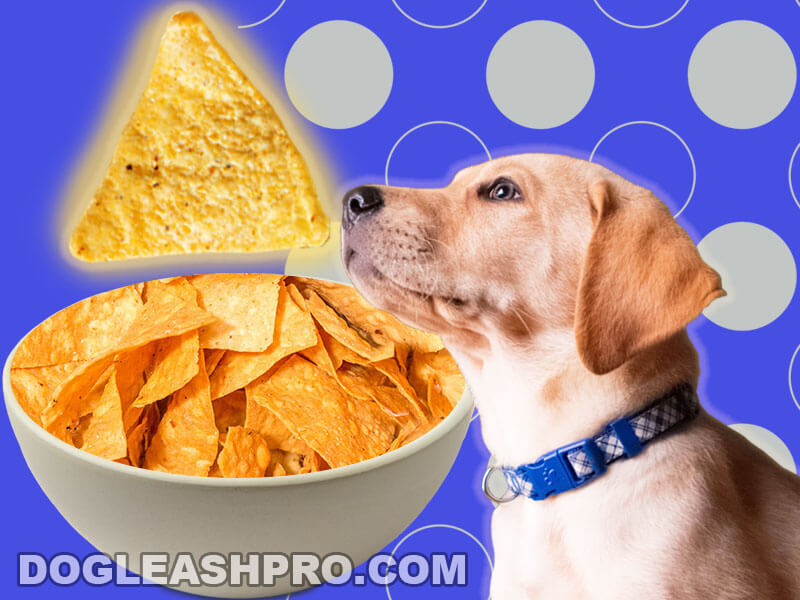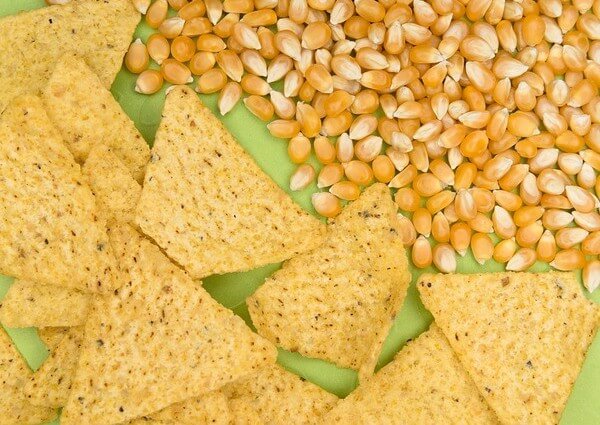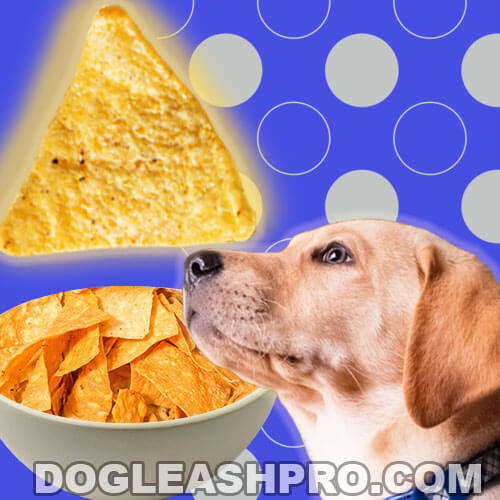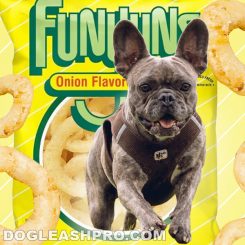
You’re snacking on some Tortilla Chips with your favorite Hummus dip when your furry friends come running over and begging you for some with their lovely puppy dog eyes. As you continue to munch on your Tortilla Chips, your dogs start to drool and continue to beg. Now you’re wondering, “Can my dog eat Tortilla Chips?” Here’s the short answer first.
Can dogs eat Tortilla Chips? No, dogs should not eat Tortilla Chips as this human snack is high in calories, sodium, fat, carbohydrates, and sugar which can lead to various health problems in dogs. The Tortilla Chips are not healthy for dogs and can instead cause upset stomach, bloating, and digestive issues in dogs. If you must, you can give your canine companion one or two Tortilla Chips and no more than that.
Table of Contents
Can dogs have Tortilla Chips?

No, dogs should not have Tortilla Chips. Even though Tortilla Chips are not considered toxic or poisonous to our canine companions, it doesn’t mean that we, as dog owners, should give them this crunchy human snack.
In order to fully understand why it’s not a good idea to give our four-legged friends Tortilla Chips, we need to take a look at both the ingredients and the nutritional profile of your typical Tortilla Chips.
Let’s start with the ingredients first:
Tortilla Chips Ingredients
- Corn.
- Vegetable oil (corn, soybean, canola and/or sunflower oil).
- Buttermilk powder.
- Salt.
- Tomato powder.
- Whey.
- Corn maltodextrin.
- Garlic powder.
- Onion powder.
- Corn starch.
- Modified corn starch.
- Corn syrup solids.
- Dextrose.
- Yeast extract.
- Reduced lactose whey.
- Spices.
- Malic acid.
- Natural and artificial flavor.
- Cheddar cheese (milk, cheese cultures, salt, enzymes).
- Vinegar solids.
- Disodium inosinate and guanylate.
- Disodium phosphate.
- Citric acid.
- Lactic acid.
- Blue cheese (milk, cheese cultures, salt, enzymes).
- Extractives of annatto and turmeric.
- Artificial color (red 40, yellow 5, blue 1, titanium dioxide).
RECOMMENDED: Can Dogs Eat Cornbread?
Now, let’s take a look at the nutritional profile of Tortilla Chips:
Nutritional Profile of Tortilla Chips (2 chips or 4 grams)
| Name, Unit | Amount |
| Calories, cal | 20 |
| Sugar, g | 0.13 |
| Sodium, mg | 32 |
| Carbohydrate, g | 2.53 |
| Total Fat, g | 0.93 |
| Protein, g | 0.13 |
| Fiber, g | 0.27 |
| Iron, mg | 0.05 |
| Calcium, mg | 5.32 |
| Fatty acids, total saturated, g | 0.13 |
| Fatty acids, total monounsaturated, g | 0.27 |
| Fatty acids, total polyunsaturated, g | 0.53 |
As we can see, in just 2 Tortilla Chips or 4 grams, there are 20 calories, 0.93 grams of fat (0.13 grams saturated), and 2.53 grams of carbohydrate (0.13 grams of sugar).
So are Tortilla Chips bad for dogs? Let’s find out next.
Are Tortilla Chips bad for dogs?

Yes, Tortilla Chips are bad for dogs and there are various reasons why even though this human snack is neither toxic nor poisonous to dogs.
Just by looking at the ingredient list and the type of ingredients used, we know that the Tortilla Chips are highly processed, fried in oil that isn’t good for our dog’s health, contain tons of seasonings that aren’t safe for doggy consumption, and are packed full of salt.
All of this is a recipe for disaster when it comes to our dog’s health.
When taking a look at the ingredient list, it’s important to know that the product ingredients are listed from the highest amount to the lowest amount. Whatever ingredient is listed first on the ingredient list means there’s the highest amount of that ingredient.
For instance, we can see that corn is the first ingredient on the list. This means that corn is the ingredient that manufacturers used the most to make Tortilla Chips. Thus, Tortilla Chips are made of corn and a lot of what makes up Tortilla Chips is corn.
Corn in and of itself is good for dogs; corn in Tortilla Chips is not good for dogs
When it comes to corn, it’s important to note that corn in and of itself is actually good for our dogs and can be a part of your canine friend’s nutritious and well-balanced diet.
That’s because corn is packed full of protein, fiber, carbohydrates, vitamins, antioxidants, and linoleic acids (omega-6 fatty acids).
However, there are several ways corn is no longer good for our furry friends:
- If the corn is seasoned with oil, sodium, and butter
- Corn is highly processed and fried in several types of oil.
- Corn chips that are drowned in high amounts of salt, garlic and onion powder, spices, and added with artificial flavors and colors.
Therefore, Tortilla Chips are no longer healthy for our four-legged friends.
You may also like: Can Dogs Eat Funyuns?
High salt content in Tortilla Chips can cause sodium poisoning in dogs
In just 2 Tortilla Chips, there is 32mg of sodium! While it is not a lot for us, this is considered a lot of salt intake for our precious pups.
While salt is essential for proper cellular functions (nerve signal transmission, fluid balance, and acid-base balance) in dogs, ingesting too much salt can become a serious health problem.
Keep in mind that your dog’s regular main meal should already contain the necessary amount of salt intake he or she needs each day. If you’re giving Tortilla Chips to your dogs in addition to the main meal, then Tortilla Chips would be considered a snack or treat.
Snacks and treats should only make up 10% of your dog’s daily calories while 90% of his calories should come from a well-balanced and complete diet.
If your pooch has already received and satisfied his daily sodium intake amount, giving him more than a few Tortilla Chips could cause him to have salt poisoning.
Remember that our furry friends need between 0.25g to 1.5g of sodium per 100g of food. If your precious pooch goes beyond that, he may get salt poisoning.
Signs and symptoms of salt poisoning include:
- Nausea.
- Swollen tongue.
- Vomiting.
- Abdominal pain.
- Bloating.
- Upset stomach and digestive issues.
- Watery diarrhea.
- Frequent urination.
- Dehydration.
- Extreme thirst.
- Loss of appetite.
- Convulsion.
- Confusion.
- Walking around like he’s drunk.
- Headache.
- Breathing difficulty.
- Tachycardia: fast heartbeat.
- Fluid buildup.
- Muscle weakness.
- Muscle tremors or muscle spasms.
- Fever.
- Loss of energy.
- Feeling lethargic.
- Seizures (in severe cases).
Handy Hint: The color and texture of your dog’s vomit can tell you a lot about why he’s feeling sick. Check out Dog Vomit Color Guide where we go over different dog vomit types and what the different vomit colors mean. Keep this handy for whenever your pooch feels under the weather.
If you suspect your furry friends have sodium poisoning, we highly recommend that you contact your vet right away. Salt poisoning requires immediate medical attention and the sooner it’s treated, the better.
Your vet may ask you to bring your pooch to a veterinary hospital. At the hospital, you can expect the vet to perform a thorough physical examination of your pooch and they may use x-rays, CT scan, MRI, ultrasound, and EKG.
You’ll want to let the vet know approximately how many Tortilla Chips your dog had and at what time he ate the Tortilla Chips.
If the vet finds your pooch is dehydrated, he may administer electrolytes, oxygen, and IV fluid therapy.
Depending on how severe the sodium poisoning is, the vet may request that your Fido stay overnight at the hospital or even for a few days. That’s because the salt level in your dog’s body can only be brought down slowly and gradually. Any sudden and drastic changes in the salt level can actually cause either brain swelling (cerebral edema) or a heart attack.
High carbohydrate content in Tortilla Chips is harmful to dog’s health
Taking a look at the carbohydrate level in Tortilla Chips, there are 2.53g of carbohydrates in just 2 Tortilla Chips!
So why are Tortilla Chips so high in carbohydrates?
There are many reasons why Tortilla Chips are high in carbs.
First, their main ingredient, corn, is high in carbs. Another ingredient used to make Tortilla Chips is corn starch, which is also a type of carbohydrate. Then you also have modified corn starch.
While a well-balanced, nutritious, and low-carb diet is best for dogs, a diet or a treat that is high in carbs is harmful to our dog’s body and health. That’s because our dogs’ bodies lack an enzyme (a special protein) called amylase, which is responsible for digesting food.
Since our four-legged friends lack the amylase enzyme, they will have a difficult time digesting processed food or treats like Tortilla Chips. When our furry companions consume food or treats that are heavily loaded with carbohydrates, it really puts huge pressure on their digestive system.
Regularly eating processed food like Tortilla Chips that are high in carbohydrates will eventually lead to several health issues including diabetes, canine obesity, and even cancer. This is why it’s important that dog owners keep highly processed, high-carb food away from their pups.
Vegetable oils used in Tortilla Chips are not healthy for dogs
As we can see on the ingredient list, there are several types of vegetable oil used to make Tortilla Chips. They are corn oil, soybean oil, canola oil, and sunflower oil.
Of all the oil types listed here, sunflower oil is the only one that is best for dogs.
Compared with other vegetable oils, soybean oil is known to contain more saturated fat which makes it a lower-grade vegetable oil option. Saturated fat is also bad for dogs because they are more difficult for the dogs’ bodies to metabolize.
Saturated fat also puts more pressure on the digestive system and internal organs such as the pancreas and the liver and can even disrupt the balance of good and bad bacteria in your pups’ gut. This can lead to a weaker immune system in dogs.
When it comes to canola oil, it’s important to note that canola oil is more processed than other types of vegetable oil. Canola oil is also most likely to come from crops that have been genetically modified. Ultimately, canola oil isn’t the healthiest for dogs.
We know that Tortilla Chips are crunchy and tasty because they’ve been fried in heated oil and in the various types of vegetable oil listed above. This is why Tortilla Chips are unhealthy for doggy consumption because they contain an excessive amount of unhealthy oil that can harm your K9 friend’s health.
Onion and garlic powder in Tortilla Chips are both toxic to dogs
While we don’t know how much onion or garlic powder was used to make Tortilla Chips, we do know that they are listed near the top of the ingredient list.
A general rule of thumb is to never give any food, treats, or snack that contains garlic or onion powder to our canine friends. That’s because both onion powder and garlic powder are toxic and dangerous to our furry friends.
Onion and garlic belong to the allium family and they both contain thiosulfate. While not harmful to us, thiosulfate is extremely dangerous to our K9 friends. Thiosulfate is toxic to dogs because can cause oxidative damage to the red blood cells and this will lead to hemolytic anemia in dogs.
Signs and symptoms of garlic and onion poisoning include:
- Heavy panting.
- Breathing difficulty.
- Heavy drooling.
- Vomiting.
- Upset stomach.
- Diarrhea.
- Increase heartbeat.
- Abdominal pain.
- Loss of appetite.
- Body weakness.
- Fainting.
- Lethargy.
- Pale or blue gums.
- Dark reddish urine.
- Depression.
If you suspect your canine friends have onion poisoning or garlic poisoning, we highly recommend that you contact your vet right away. Don’t wait around and second guess. Onion and garlic poisoning in dogs is serious and requires immediate medical attention. The sooner it is treated, the better.
Depending on how severe the onion or garlic poisoning is, your vet may ask you to bring your pup in for a checkup where he or she may have to induce vomiting. If it’s severe, your canine friend may need a blood transfusion.
Did you know? The spicy and hot Takis chips are also made of corn flour and fried in palm, soybean, and canola oil. So is Takis safe for doggy consumption? Check out Can Dogs Eat Takis? Here’s Our Hot Take to find out!
Corn syrup solids in Tortilla Chips are sugar your dogs don’t need
The 0.13 grams of sugar in just two Tortilla Chips most likely came from the corn syrup solids. So what are corn syrup solids?
Corn syrup solids are basically the dried version of the liquid corn syrup. And corn syrup is a sweetener or simply sugar.
Our canine companions don’t need sugar in their diet at all. While 0.13 grams of sugar may not seem like a lot of sugar to us, it is 0.13 grams of excess sugar our dogs don’t need.
This is another reason why we need to be careful and avoid giving our dogs Tortilla Chips. Not only do we put our pups at risk for sodium poisoning when we feed them Tortilla Chips regularly, but also we put them at risk of serious health issues like obesity, diabetes, dental disease, and even pancreatitis.
When our furry friends consume more sugar than what they’re used to, they may get an upset stomach and this may lead to vomiting or watery, bloody, and even explosive diarrhea. That’s because too much sugar consumption can disrupt the balance of bacteria and other microorganisms in their gut.
Also, the bacteria in your dog’s mouth use the sugar to produce acids. The acids will then eat away at the enamel of your dog’s teeth. The enamel is the outer coating that protects your dog’s teeth and without it, it can lead to tooth decay and cavities.
DISCLAIMER: THIS WEBSITE DOES NOT PROVIDE MEDICAL ADVICE
The information, including but not limited to, text, graphics, images and other material contained on this website are for informational purposes only. No material on this site is intended to be a substitute for professional veterinary advice, diagnosis, or treatment. Always seek the advice of your veterinarian or other qualified health care provider with any questions you may have regarding dietary needs.
Resources:
https://en.wikipedia.org/wiki/Tortilla_chip
https://www.petpoisonhelpline.com/pet-safety-tips/are-onions-poisons-to-dogs/

With over five years of specialized experience as an animal writer, my expertise lies in dog nutrition, health, behavior, grooming, and training. I am dedicated to delivering helpful and informative content that caters to the well-being of our furry friends. My primary goal is to empower pet owners with knowledge and ensure our canine companions thrive in health and happiness. In my free time, I love volunteering at local dog rescue centers.







